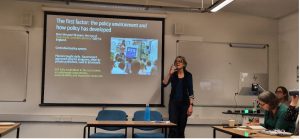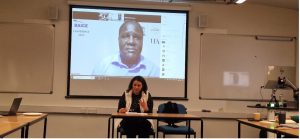Uta Papen (University of Lancaster), Ahmmardouh Mjaya (University of Malawi), Vicky Christoforatou, Mohammad Naeim Maleki, Catherine Jere and Anna Robinson-Pant (University of East Anglia)
The New Literacy Studies (NLS) emerged in the 1980s (Street, 1984) as a response to the growing recognition that literacy is used and learned, not only within classrooms, but within everyday life. Based on in-depth ethnographic research conducted in different contexts such as religious institutions, markets, health centres and homes (Barton, 1994), the NLS have informed sociocultural and practice-based approaches to literacy and still have much to offer to teachers and policymakers. And yet this impressive body of work has had little impact on policy (Papen, 2023).

On the 18th of January 2024, the UEA UNESCO Chair for Adult Literacy and Learning for Social Transformation kickstarted the new year with a thought-provoking and engaging literacy forum, raising the question ‘Why do the New Literacy Studies struggle to influence policy?’ Posing this question was Professor Uta Papen from the Lancaster Literacy Research Centre, University of Lancaster.
Uta Papen’s insightful presentation explored the interface between literacy research and policy, focusing on primary education in England. It addressed three factors that have hindered the influence of sociocultural and practice-based literacy approaches on policy: the policy environment itself and how it has changed; the wider economy of literacy research and what knowledge counts in the interface between research and policy; and the role of the media and public discourse in the relationship between research and policy. Uta shared her reflections on the use of phonics in early years literacy education to illustrate these constraints.
Over the past 30 years, there has been a substantive rise in the use of systematic synthetic phonics (SSP) in primary schools in England. The centralised policy system emphasises daily phonics instruction using specific government-approved programmes. Additionally, the Phonics Screening Check, where pupils’ decoding abilities are tested through 40 words (20 of which are pseudowords, phonetically regular combinations of letters forming a word that, however, have no meaning) is a nationwide assessment tool and has reinforced phonics teaching. These policy developments have made it challenging for teachers to incorporate diverse literacy practices and ideas from sociocultural approaches, as the focus is on promoting a uniform approach to literacy teaching.
The audience also heard that, in terms of research evidence, the policy move to SSP has been influenced by a limited number of studies which were consistently referenced in DfE documents, with Pearson’s “Clackmannanshire study” as the ‘darling’ of the English Education Minister’s phonics programme being consistently referenced. Uta argued that research critical of SSP has been largely disregarded. Recent policy papers continue to reference psychological studies, emphasising evidence-based practices and randomised-controlled trials (RCTs). The preference for RCTs in policy making suits the sector-wide reform agenda desired by policy makers, as they offer easily identifiable and defined knowledge, while excluding studies adopting other methodologies, such as ethnography which is frequently used by New Literacy Studies researchers.
The presentation concluded by exploring new pathways to policy impact, including proposed alliances with teachers, a focus on creating evidence and pedagogical models, drawing in ideas from the New Literacy Studies that can be implemented on a larger scale.

Vicky Christoforatou (Lecturer in Education on the Secondary PGCE course (English) at the University of East Anglia) offered important context to the discussion. She argued that policy, including the Education Inspection Framework in the UK, foregrounds one kind of knowledge only: schooled, academic, and ‘true’ knowledge; knowledge that must be learned and remembered.
Within the context of secondary English Language and Literature Education in England, this is problematic when engaging pupils with reading and responding to texts as well as producing texts. For example, in reading, different interpretations of texts are possible and, in writing, pupils, like authors, make choices. Manufactured responses that meet assessment criteria are privileged, whereas authentic responses and pupils’ own experiences with texts are not valued.
In another context with its own fabricated crisis, Initial Teacher Training, a mandated curriculum (ITT Core Content Framework) is a reductive list of ‘what works’ statements that pre-service teachers have to consume and then implement in their practice. All, irrelevant of phase or specialism, must also learn that SSP is the best way to teach reading.
In the two contexts above, it may seem that there is little space for sociocultural approaches. But there is space for creative compliance, for teachers participating in small or larger action research projects. Vicky concluded her contribution to the forum by bringing to mind Lawrence Stenhouse and calling for ways to celebrate teachers’ voices, create opportunities for teachers to collaborate and share their findings in accessible ‘platforms of knowledge’.
Responding to Uta’s presentation and presenting a perspective from Sub-Saharan Africa, Dr Ahmmardouh Mjaya of the University of Malawi, noted that an emphasis on valued, functional skills overshadows the socio-cultural and practice-based understanding of literacy. And that reconciling functional skills and ‘literacy as social practice’ perspectives is an ongoing dilemma; a skills perspective that values assessment and its associated metrics is more easily accessible to policymakers.
Unfortunately, literacy measurement and assessment processes, in their current form, contradict the very spirit of the socio-cultural understanding of literacy and the contribution of the NLS. By contrast, the practice approach is learner-centred, focusing very much on what the learners do with their literacy and not on how much they have learnt after a programme.
However, Ahmmardouh argues, objection to current forms of literacy assessment without providing an alternative approach does not help to make a case with policy makers. He agreed with Uta and Vicky about the importance of working with teachers and keeping conversations regarding the practice approach to literacy alive. He raised significant concerns that working with teachers, instead of policymakers, might appear as if we are pushing the approach through the back door. And that literacy learnt through the socio-cultural approach could appear as secondary or less important; while the phonics approach would be deemed the ‘real’ literacy.
Ahmmardouh also spoke of how, in certain contexts, alliances might raise ethical issues. In Malawi, the curriculum is centralised and teachers are regularly monitored by education advisors to ensure that they are teaching the stipulated content. In this regard, there is a possibility that teachers found to be teaching ‘unsanctioned’ content could be disciplined. Related to this point is the issue of the purposes for learning literacy in preschool and lower primary and how the socio-cultural approach to literacy relates to these aims. In a Malawian context, at this level, literacy is mainly taught for academic advancement. So, it may be difficult to convince even teachers to forge these alliances in a context where the education system expects all learners to move in one direction.
The suggestion about producing a synergy of empirical evidence that may help in convincing individuals outside our circles is plausible. Perhaps, what is critical is the development of clear pedagogies of the socio-cultural approach to guide teachers, and to provide an operational outline of how learning through this model can be accounted for and by whom.
Uta Papen’s reflections on the links between the NLS and policy contexts, combined with the respondents’ ethical and political perspectives from Malawi and England provided a stimulating discussion at our UNESCO Chair Forum. We are looking forward to hearing about your ideas on literacy, research and policy in the contexts where you work – do share your comments!
About the UEA UNESCO Chair
This partnership between UNESCO, the University of East Anglia and six universities in the Global South was established in 2016. We aim to develop understanding about how adult learning – particularly for women and young adults – can help address inequalities in the poorest communities of the world. Through investigating how or why adult literacy might facilitate or respond to processes of social transformation, including women’s empowerment, this UNESCO Chair programme sets out to strengthen the interaction between formal, non-formal and informal learning in research, policy and programmes.
Contact: UNESCO Chair unesco.chair@uea.ac.uk
References
Barton, D. (1994) Literacy: an introduction to the ecology of written language, Oxford: Blackwell
Papen, U. (2023) Literacy Research and Its Relationship with Policy: What and Who Informs Policy and Why Is Some Research Ignored? Research in the Teaching of English, 58/1, August 2023
Street, B.V. (1984) Literacy in Theory and Practice, Cambridge: Cambridge University Press